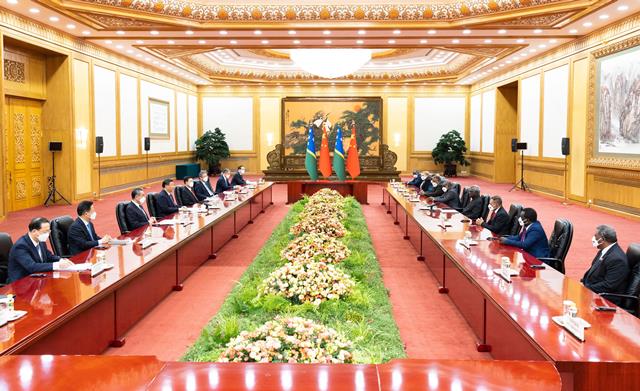 July 2023: Chinese President Xi Jinping meets Solomon Islands Prime Minister Manasseh Sogavare at the Great Hall of the People in Beijing. [photo: Huang Jingwen/Xinhua/Alamy]
July 2023: Chinese President Xi Jinping meets Solomon Islands Prime Minister Manasseh Sogavare at the Great Hall of the People in Beijing. [photo: Huang Jingwen/Xinhua/Alamy]
[This is an excerpt from an article in The Round Table: The Commonwealth Journal of International Affairs.]
The security pact between the Solomon Islands and China which was shrouded in secrecy sent shockwaves in Washington, Wellington, and Canberra. The Solomon Islands are part of the ethnically Melanesian group of islands which was under the British, and in 1978 became a constitutional monarchy under the British Crown. They are strategically located between Papua New Guinea and Vanuatu, as well as the Pacific military bases of the US and Australia. The disconcerting part of this security pact is that it enables Beijing to send its military forces, police, and law enforcement, at the request of the Solomon government. China can also carry out ship visits for logistical replenishment and other forms of logistical support. Even Chinese warships can be permitted to dock. Concerns have been raised about the extent to which these developments could impact the balance of power in this vital shipping region. Almost eight countries in the region are now China’s ‘comprehensive’ strategic partners. Beijing is increasingly projecting itself as a security provider in the first and second island chains. Australia fears the possibility of a Chinese military base coming up on the Solomon Islands, posing an existential threat to Canberra.
For Commonwealth countries like Australia, the deal has turned out to be a ‘strategic nightmare’. If China does establish a military base, potentially in Isabel Province of Solomon Islands, it will be just 2000 km from Australia’s eastern coast, and could become its ‘little Cuba’. Moreover, the South Pacific islands lie across the most important sea and air lanes of communication for Australia. The Prime Minister of the Solomon Islands, Manasseh Sogavare, denied any such intention. However, the fact is that the Solomon Islands economy is largely dominated by Chinese businesses, including natural resource extraction. The Solomon government contends that it has entered the Security Pact with ‘its eyes wide open’. However, many Solomon Islanders foresee the possibility of being caught in the geo-strategic crossfire.
Scramble for the Pacific: Small island states play the new Great Game
The Security Pact has now become a geo-political and geo-strategic tussle between Australia, China, and the Solomon Islands. Hence, the South Pacific has been witnessing diplomatic courting of a kind never seen before. Washington now promises a free, open, and resilient Indo-Pacific to ensure peace, prosperity, and security in the Pacific region. Washington fears the possibility of a new front following the Chinese strategic incursions in the Solomon Islands and Kiribati, both Commonwealth countries. Australia has to strike a balance between its strategic concerns on the one hand, and the need to ensure the sovereignty of the South Pacific Island states on the other.
Australian Defence White Papers have clearly identified its zone of strategic interests as the Indo-Pacific. The geopolitical priorities and interests of the South Pacific Islands are at variance with Canberra, as these islands do not want to get trapped in the crossfire of the US and China. The geopolitics of the South Pacific primarily poses a major strategic nightmare for Australia, in the midst of Chinese strategic presence in the Solomon Islands, its potential militarisation, and overall concerns about the balance of power in the South Pacific.
M.J. Vinod is with the Department of International Studies, Political Science and History, Christ University, Bangalore, India.



